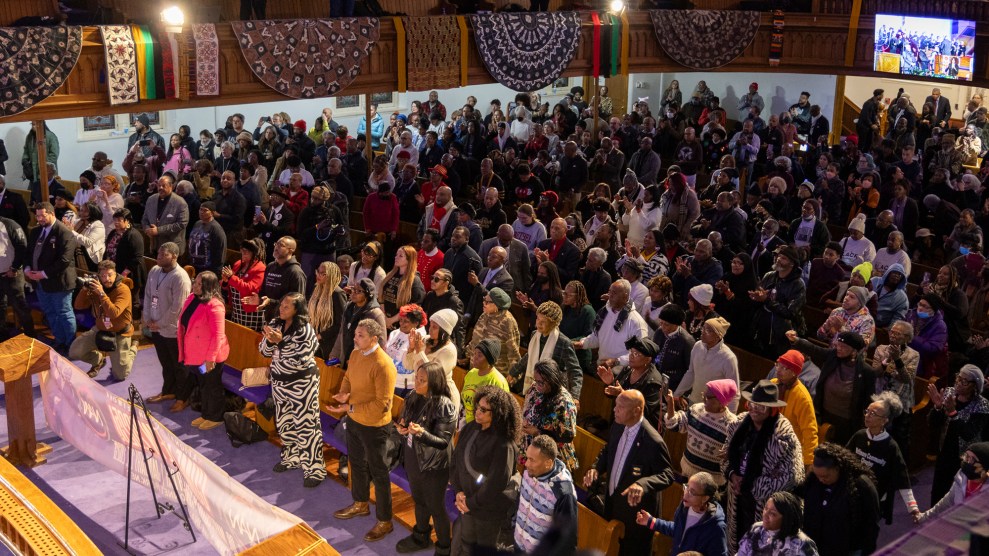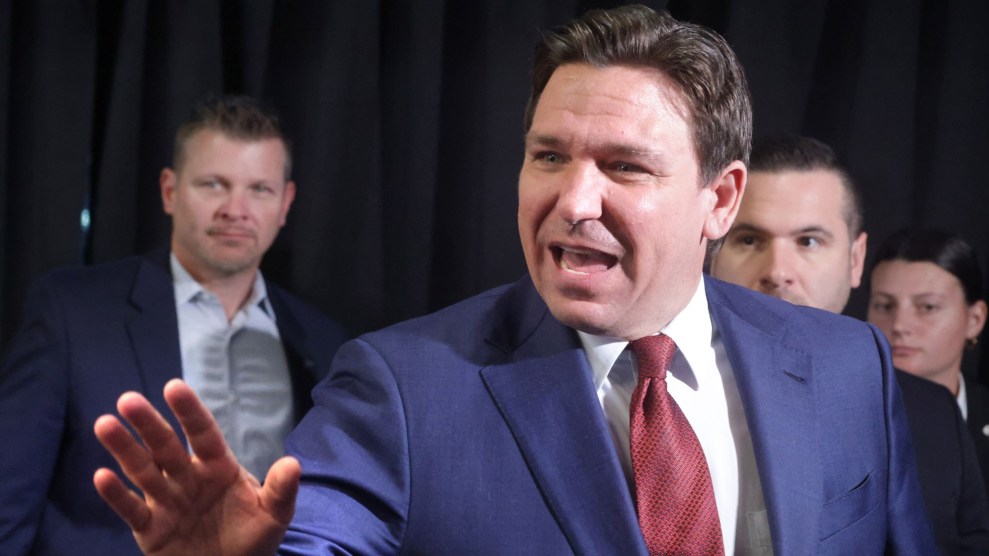Late one evening in mid-January I got a call from my most rational, economically informed friend. He usually gives me sound advice on the value of doubt, the power of randomness, and the rough justice of markets. But on this particular night, my buddy Paul Solman, the esteemed business correspondent for “The Newshour With Jim Lehrer,” had gone slightly mad. He was utterly convinced that his New England Patriots, everyone’s Super Bowl underdog, were bound to beat the 14-point spread. No matter what the Vegas, London, and sports bookies thought, he simply knew his team was a great bet. I saw the chance to make a smart friend look like a sucker, and, like a good American, I took it.
You might think an editor who would attack the gambling industry would lead a more puritanical personal life. But, like many Americans, I like to play games and win. It’s not that I’m addicted to blackjack or that I believe the big win will transform my life. It’s just that I’m an optimist, and I relish the chance to confirm that good fortune is on my side.
Many Americans enjoy gambling for a similar reason. The gambling explosion happening on riverboats and Indian reservations, in obscure suburbs and rural towns (in addition, of course, to Atlantic City and Las Vegas) isn’t being fueled by a sudden surge in national masochism. Ours is a risk-taking culture — that’s why a prohibition of gambling won’t work. Besides, we already learned in the ’30s that prohibition leads to more corruption. Since people will gamble anyway, it’s better to regulate this industry than to cede control of it to organized crime.
Regulating the gambling industry, however, raises tricky political and moral questions. Although the gambling boom may not pose obvious problems today, it signals the spread of a corrosive social disease — one that goes beyond lotteries, casinos, and horse racing. It is a bitter irony that the people likely to lose the most as the industry expands are the very people who can least afford defeat, people who are already losing their slots in the winner-takes-all global economy.
Already those in low-income brackets spend four times as large a percentage of their income on lottery tickets as those in the highest income group, according to Robert Goodman, author of The Luck Business. A study done by Harrah’s in its own casinos showed that the yearly income of the most frequent casino visitors is $39,000 and that slightly less than half of those players have no college education. No longer confident that steady effort in the workplace guarantees success, people seek economic advancement in temples of pleasure that hold out the promise of the redemptive jackpot. Before our eyes, Calvinism is transforming into casinoism.
The transformation into a casino culture also creates significant losses for those who choose not to wager. Gambling has long been associated with increases in crime, drunken driving, prostitution, child abuse, and broken families. Some experts believe that problem gamblers make up 4.5 percent of the U.S. population. A 1990 Maryland report showed that the state’s 50,000 compulsive gamblers were responsible for $1.5 billion in declining work productivity, embezzlements, and other losses. Another researcher estimated that problem gamblers are responsible for $1.3 billion worth of insurance-related fraud annually.
But the gambling explosion isn’t a matter of corporate sadism for pure pleasure. Fundamentally, in order to sustain growth, gambling companies must drain money from the most vulnerable members of society. Why are we letting them do this? Because we’ve been hoodwinked. The expansion of the “gaming” industry is being sold as easy money when, in fact, it’s a pyramid scheme. The first people in win big and almost everyone else loses.
The early gambling entrants — Las Vegas and Atlantic City — have booming economies because they attract out-of-state dollars. But other places, such as Iowa, which legalized riverboat casinos in 1989, wind up attracting locals and depleting their own economies. People are all too easily suckered. Casino executives sold gambling to the Iowa public as an easy, enjoyable cure for a depressed economy. Claiming the riverboats were mainly for entertainment, they instituted $5 bet limits and $200 loss maximums, restricted the hours when people could gamble, and allowed only a few varieties of games. But soon gambling companies started lobbying nearby states to legalize gambling, arguing that new casinos were the only way to stop casino cash from flowing into Iowa. Soon after Iowa enacted its riverboat law, Illinois and Mississippi legalized casinos with no bet limits, no loss maximums, and virtually every kind of game.
By 1994, casinos had also sprung up in Louisiana and Missouri. To compete with these newcomers, Iowa got rid of bet limits, opened casinos all day and night, and allowed all but a few games. Suddenly, Iowans had a hardcore, Vegas-style gambling habit to support. “The promised benefit to the business community and retailers never did materialize,” says LuAnn Gaskill, an associate professor at Iowa State University who studied the impact of gambling on Iowa’s small businesses.
Gambling executives defend this harmful “gaming” industry with the promise of tourism revenue from out-of-state visitors. Indeed, in Las Vegas, 80 to 90 percent of players come from elsewhere; virtually none of those who gamble on Indian reservations live there; and the casinos popping up on the Canadian border have been built largely to attract Americans.
But the continuing proliferation of places to gamble means that soon most players won’t have to travel far to get to casinos. When they feel like betting the house they won’t have to leave home. In 20 years, most states will have legalized casino gambling, and casino towns of the future will look less like Las Vegas and more like gambling sites in Illinois, where, according to a recent study, only 16 percent of patrons come from across state borders. Of course, local gamblers don’t bring outside dollars. Instead, they wager what they would have spent on movies at the local theater, baseball games, or dues for the Elks Lodge.
Who knows if people will go to casinos at all in the future. As our cover package points out, with gambling sites already invading the World Wide Web, it won’t be long before you have a chance to lose your shirt without even troubling to put it on. Conservative estimates predict that online wagering will become an $8-$10 billion business by the year 2000. Just as drinking alone can allow alcoholism to go unchecked, cyberbetting seems a likely problem for compulsive gamblers, who will find none of the social buffers (time, distance, some friendly advice from the local bookie) that might curb betting appetites.
The vast majority of informed citizens understand the dangers posed by unlimited gambling. That’s why voters, when given a chance, defeat gambling initiatives. Even a couple of states that initially supported gambling (Iowa and Louisiana) have experienced recent backlashes against the industry.
But where are our public leaders? Far from protecting citizens, our government officials are putting them at greater risk. Several states have already moved from regulating gambling to promoting it. State governments have become addicted to lotteries and casino taxes. Examples abound: In the 1980s, the California State Lottery became one of the biggest purchasers of radio advertising in Los Angeles County; the governments of Ontario and Quebec actually own their own casinos; and U.S. federal lawmakers recently passed a bill that will allow gambling on ships flying U.S. flags. Will the government’s nascent addiction to gambling soon play a role similar to the one tobacco plays in Taiwan, where the government sells 85 percent of the cigarettes the Taiwanese smoke?
When a pleasurable activity such as gambling turns into an epidemic, when a regime that is supposed to protect the public health instead encourages socially destructive behavior, how can we move toward a workable solution?
The first step is to halt further expansion of gambling until large-scale studies assess the impact new casinos have already had. An independent agency should conduct this research — not a panel appointed by politicians, such as the new Clinton/Lott/Gingrich sham, the National Gambling Impact Study Commission. We also should consider enacting a sin tax directed primarily at the house, not just the player.
State politicians who endorse gambling often rationalize that they have little choice but to compete with nearby communities that open casinos. They’ve become official salespeople for gambling’s pyramid scheme — and well-paid salespeople at that. The gambling industry has given more than $100 million in political contributions in the last five years in its attempt to expand its business one state at a time.
That’s why there must be limits on the amount of money gambling interests can spend on lobbying and donations to state officials. As long as our political leaders’ votes are for sale to the highest bidder, the gambling industry can hardly lose.
















